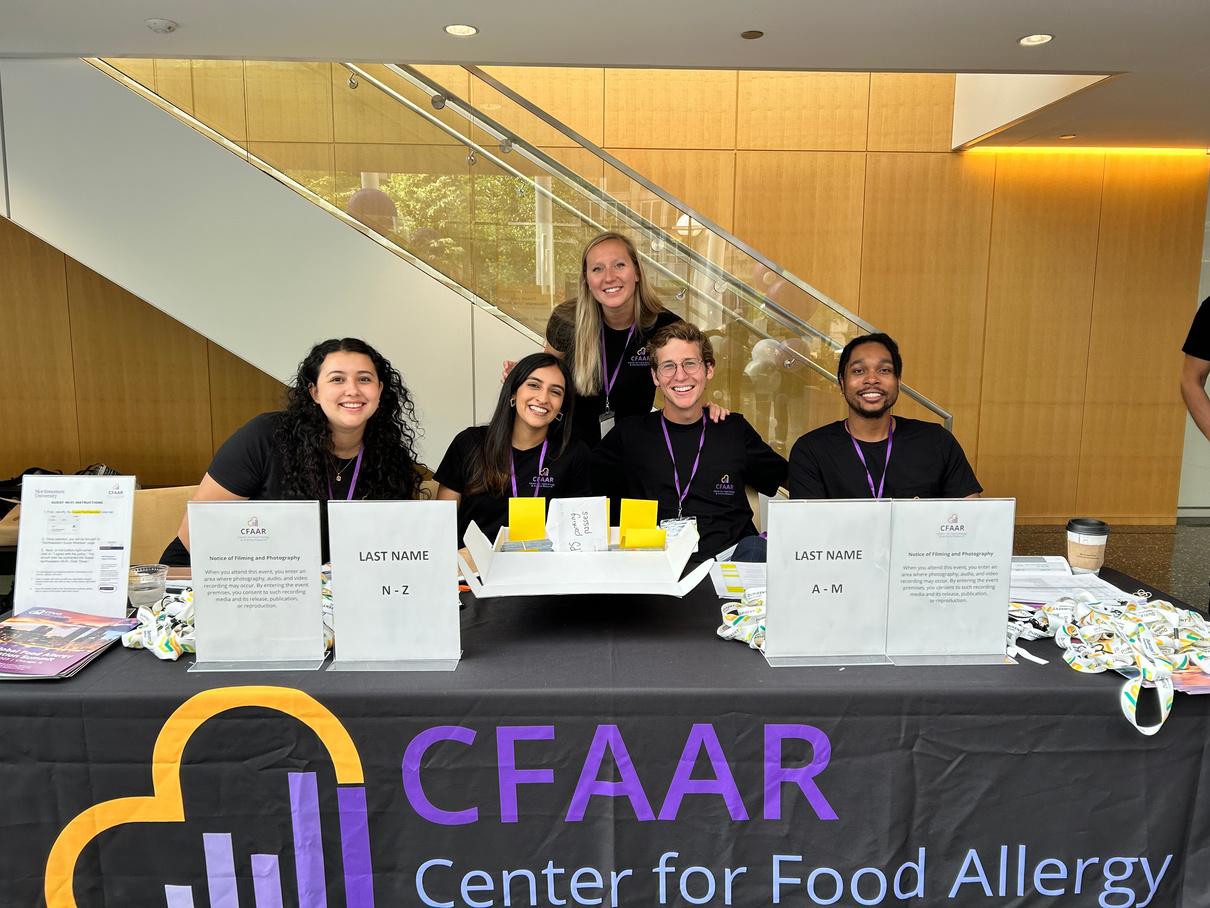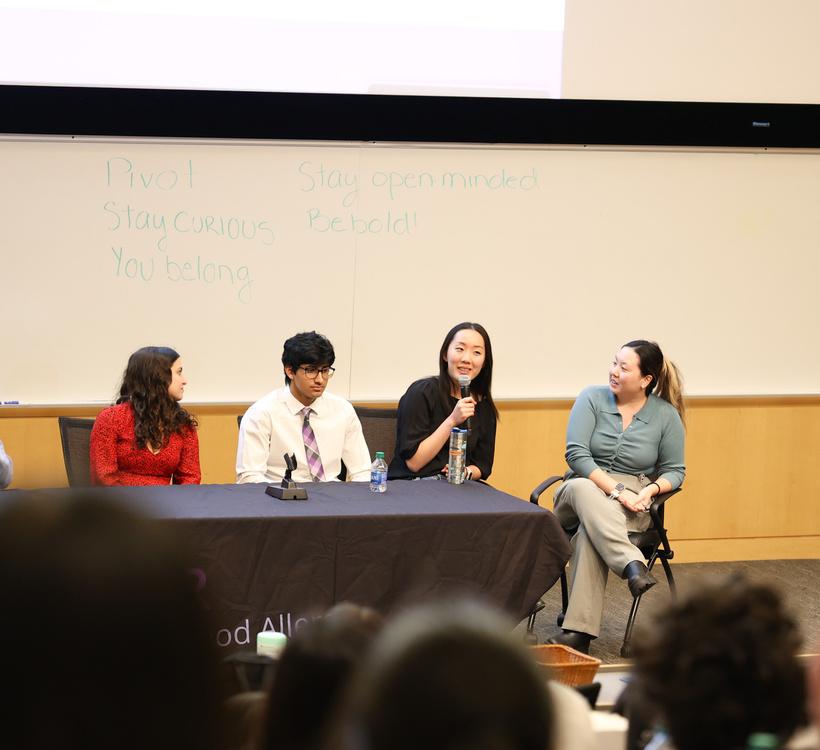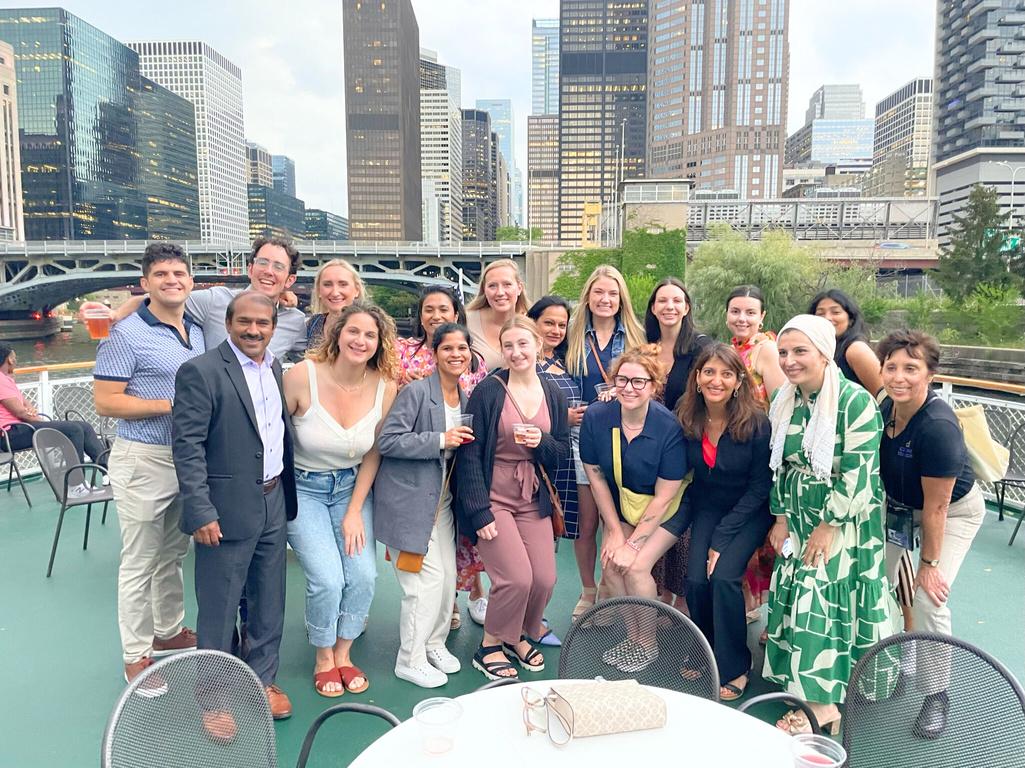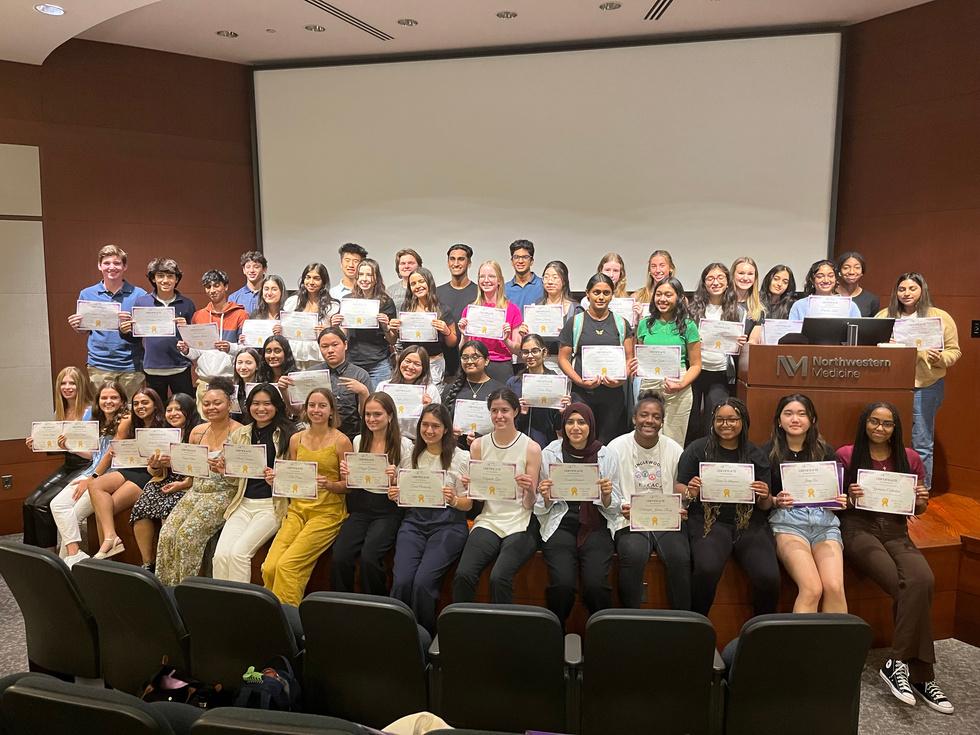
Center for Food Allergy & Asthma Research










The Center for Food Allergy and Asthma Research (CFAAR), part of the Institute for Public Health and Medicine (IPHAM) at Northwestern University Feinberg School of Medicine and Ann & Robert H. Lurie Children’s Hospital of Chicago, aims to find answers and shape policies surrounding food allergy, asthma and other allergic conditions.
Led by Ruchi Gupta, MD, MPH, CFAAR is comprised of three interdisciplinary and collaborative research cores:
1
) Public Health Data Repository
2.) Clinical Research
3.) Community/School Outreach
These cores are led by experts in the fields of epidemiology, health services research, health behavior, patient care, and advocacy seeking to make meaningful improvements in the health of children, adults, and families living with allergic disease


CFAAR's mission is to lead innovative research that transforms the lives of communities with food allergy and asthma through epidemiological, clinical, and community-engaged research.
Through their three research cores, CFAAR collects data to improve the understanding of the population health burden of allergic conditions, conducts groundbreaking research to equitably prevent, manage, and treat these conditions, and provides resources and education to schools, communities, and individuals around the world. Learn more about CFAAR here.
1 in
13
children have food allergy in the United States

RuchiGupta,MD,MPH

LucyBilaver,PhD

KristinKan,MD,MPH, MSc


SaiNimmagadda,MD
JessicaPalmieri,DO FoundingDirector FacultyResearcher,Directorof HealthServicesandInformatics Research
Faculty,AllergyResearch Specialist FacultyResearcher FacultyResearcher

WaheedaSamady, MD,MSCI FacultyResearcher,CoDirectorofClinicalResearch

ChrisWarren,PhD FacultyResearcher,Director ofPopulationHealth Research
The CFAAR team is composed of 7 faculty members, 2 Fellows, 2 Postdoctoral Scholars, and 50+ staff members who support administrative functions, research projects, data analysts, communications & outreach, and education & training programs.
Purpose: Collect data to help our communities understand the public health impact of food allergy, asthma, and other food-related conditions.
Recipient of NIH R21 Grant Award
Contact: christopher.warren@northwestern.edu
This study aimed to estimate the national prevalence of food allergy among a representative sample of over 40,000 US households (adults and children). Additionally, the survey study inquired information on food allergic reaction symptomology, severity, management, and psychosocial outcomes
Contact: l-bilaver@northwestern.edu
This study aims to estimate direct medical, outof-pocket, and indirect costs for the treatment and management of food allergy among caregivers of children with food allergy and adults with food allergy. This study will also estimate the health-related quality of life among these populations and by subgroups of interest such as race/ethnicity, income, insurance status, comorbidities, clinical symptom history, and number of food allergies
Contact: l-bilaver@northwestern.edu
This study aims to measure racial and ethnic, income, and geographic disparities in the diagnosis and management of food allergy, and to assess the contribution of social, economic, and environmental factors to observed disparities among children in the United States. The study will leverage administrative data sets to examine disparities: the Medicaid and CHIP TMSIS Analytic File (TAF) and the Health Care Cost Institute (HCCI) Commercial Claims Research Dataset.
Contact: shruti.sehgal@northwestern.edu
This study aims to create a Food Allergy “Data Commons” to make it possible for researchers worldwide to share data and collaborate on one platform. This global collaboration can help answer critical questions around:
The development and progression of food allergies
Severity of symptoms
Mechanisms that promote tolerance, including treatments and prevention
Contact: christopher.warren@northwestern.edu
This study aims to seek information from food allergy patients regarding the quality of life domains most relevant to food allergen immunotherapy (IT). Eventually, these data will be used to develop a patient-centered survey instrument assessing quality of life among IT patients and other key stakeholders
Contact: l-bilaver@northwestern edu
This study aims to analyze the patterns of diagnosis and treatment among children with food allergy insured through the Medicaid program. Using this data, we will analyze one year of Medicaid claims to describe the prevalence of food allergy and indicators of quality care adherent to clinical guidelines. We also will examine the county-level hot spot maps to advance our understanding of the geographic disparities in care
Purpose: Conduct groundbreaking and innovative research to prevent, manage, and treat allergic conditions

Contact: emily richardson@northwestern edu
This prevention study explores early infant introduction of peanut and other common food allergens (milk, egg, cashew, walnut, sesame, almond, and soy) in the US and the impact of early introduction on food allergy development between ages one to three. Over 1,800 infants will be enrolled from diverse pediatric practices in Chicago, and this will result in massive progress in the area of allergy prevention
This randomized controlled trial will compare early introduction of these allergenic foods versus standard introduction approaches in a large, representative sample of US infants to evaluate if the intervention can reduce risk of developing food allergy in infancy. Through this study, the team will be able to assess the efficacy, safety, and feasibility of early allergen introduction, assess infant growth and nutrition among infants, and better understand prevalence of other comorbid conditions among this population.

Recipient of NIH U01 Grant Award
Contact: brenda herrera@northwestern edu
This practice-based, two-arm, cluster randomized control trial aims to improve clinician adherence to the early peanut introduction guidelines through the use of "IREACH", a Clinical Decision Support (CDS) tool implemented in their electronic health records.
The IREACH tool will support clinicians in identifying patients at high risk for developing a peanut allergy, ordering peanut specific (s) IgE testing, referring patients to allergists, interpreting results, and counseling parents of non-peanut allergic children on early introduction
CFAAR is partnering with over 30 clinics in Illinois and over 300 clinicians and 10,000 infants will be enrolled in the study. Through this large scale prevention study, we hope to decrease the incidence of peanut allergy incidence in the U.S.

Study on Caregiver Behaviors around Food Introduction and Skin Care and Early MultiAllergen Introduction amongst US Infants
Contact: wsamady@northwestern.edu
The goal of this study is to administer a national survey to a representative US sample of 5000 caregivers. The survey will assess caregiver behaviors around food introduction and skin care and the development of atopic conditions including eczema and allergies

Contact: kyle.cattin@northwestern.edu
Recent studies have highlighted the role of changes in the skin microbiome in exacerbating atopic skin and dry scalp. This study will help determine if YoBee, a hair serum and cream, effectively restores the microbiome of atopic skin and dry scalp to more closely resemble healthy skin
Recipient of NIH R01 Grant Award
Contact: pamela newmark@northwestern edu
FORWARD is a multisite longitudinal cohort study that systematically investigates racial and ethnic disparities between Black, White, Hispanic/Latinx, and Asian children with FA in clinical and psychosocial outcomes, FA phenotypes and endotypes, and FA management practices. Sites include Lurie Children’s Hospital, Rush, Cincinnati Children’s Hospital, and DC national, and over 1000 children will be enrolled in this cohort

Supplemental Grant to FORWARD
Contact: l-bilaver@northwestern.edu
This supplement proposes to define Common Data Elements (CDEs) for food allergy using a rigorous consensus-based process that will increase the impact of the data analyses stemming from the FORWARD study Building on the previous development of a food allergy data dictionary, the team will identify and develop a set of CDEs that can help provide consistency in the way FA clinical and research data are collected in FORWARD and beyond This will allow for increased speed and quality of future FA clinical trials to advance understanding of FA.
Contact: christopher.warren@northwestern.edu
This study aims to evaluate the impact of peer support delivered as a parent peer mentoring (PPM) intervention on parent psychosocial functioning and child healthcare utilization outcomes among three pediatric chronic illness populations: food allergy (FA), type 1 diabetes (T1D), and celiac disease (CD) in a multi-method randomized clinical trial Intervention goals include 1) helping parents in their efforts to obtain support from others and include other caregivers in daily FA, T1D, and CD management, 2) reinforcing the concept of a team approach to illness management and effective job sharing, and 3) providing affirmation and validation regarding illness-related experiences and next steps in order to reduce parents’ stress and psychosocial functioning, facilitate the appropriate use of healthcare, and reduce the impact of the child’s illness on overall child and family well-being.
Contact: kkan@luriechildrens.org
This study aims to improve the design and implementation of a patient-centered, mHealth asthma intervention and to implement and test the feasibility of the intervention, enhanced through user-centered design, to improve asthma symptom control and ICS adherence
Contact: shruti.sehgal@northwestern.edu
This study aims to explore the role of diet, nutrition, and early life factors (antibiotic use and timing of food introduction), in conjunction with gut and skin microbiome variations between Indian children from urban and rural settings, with and without AD, in FA and atopy development.
Purpose: Provide tools, support, and education to students, communities, and individuals around the world
Food Equality Initiative Study Food Equality Initiative Study

Contact: samantha.sansweet@northwestern.edu
This study aims to increase access to medically necessary foods for food-insecure people with food allergies and other food-related conditions We hope to show that FEI's model of providing food is effective in increasing self-efficacy for food security.
Food Allergy Conference for Education and Science (FACES)
Contact: efolger@northwestern.edu
CFAAR hosts the annual FACES conference that aims to bring together families with food allergy, researchers, and experts from around the country to share the latest research surroundingfood allergy and new advancements in treatments, prevention, and daily living
FACESVideo
College advocates for food allergy awareness & education (CAFAE)
Contact: madeleine.kanaley@northwestern.edu

This initiative focuses on improving the college experience for students with food allergy and related conditions such as celiac disease, FPIES, and EoE. The CAFAE club is establishing chapters at colleges nationwide to provide education and promote safety and inclusion on campus.
Global Food Allergy Prevention Summit (GFAPS)
Contact: efolger@northwestern.edu
The Global Food Allergy Prevention Summit (GFAPS) is a two-day summit for clinicians and researchers seeking to strategize the future of food allergy prevention.
GFAPS Video
Contact: efolger@northwestern.edu
CFAAR invites experts, payors, policy makers, patients, and industry partners to join us for a series of health equity panels that will focus on barriers, strategies, and measuring progress in prevention, diagnosis, and treatment of food allergies and related conditions
Contact: efolger@northwestern.edu

For primary care providers interested in food allergy and related conditions including eczema, allergic rhinitis, asthma, FPIES, and EOE to discuss prevention, management, and treatments.











The CFAAR team is internationally recognized for their research. They have published the prevalence of pediatric and adult food allergy in the United States, characterized the economic impact of food allergy, and identified disparities in access to care and outcomes among food allergy and asthma patients. To reduce the burden of these diseases and improve health equity, they develop, evaluate, and disseminate interventions and conduct work to inform local, national, and international health policy.
advisory boards, clinical partners, advocacy groups, patients, and their families, CFAAR is excited to continue developing effective and impactful methods to investigate and improve the health of th with allergic conditions.
To learn more about CFAAR and how to become involved, please visit cfaar.northwestern.edu
